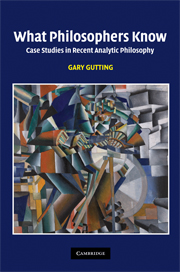Book contents
- Frontmatter
- Contents
- Acknowledgments
- Introduction
- PART I HOW DOES THAT GO? THE LIMITS OF PHILOSOPHICAL ARGUMENT
- 1 Quine's “Two Dogmas”: argument or imagination?
- 2 Argument and intuition in Kripke's Naming and Necessity
- 3 The rise and fall of counterexamples: Gettier, Goldman, and Lewis
- 4 Reflection: pictures, intuitions, and philosophical knowledge
- PART II ARGUMENTS AND CONVICTIONS
- PART III PHILOSOPHICAL TRUTH AND KNOWLEDGE
- References
- Index
4 - Reflection: pictures, intuitions, and philosophical knowledge
Published online by Cambridge University Press: 05 June 2012
- Frontmatter
- Contents
- Acknowledgments
- Introduction
- PART I HOW DOES THAT GO? THE LIMITS OF PHILOSOPHICAL ARGUMENT
- 1 Quine's “Two Dogmas”: argument or imagination?
- 2 Argument and intuition in Kripke's Naming and Necessity
- 3 The rise and fall of counterexamples: Gettier, Goldman, and Lewis
- 4 Reflection: pictures, intuitions, and philosophical knowledge
- PART II ARGUMENTS AND CONVICTIONS
- PART III PHILOSOPHICAL TRUTH AND KNOWLEDGE
- References
- Index
Summary
The previous three chapters have a distinctly skeptical conclusion: in three of the most admired and cited examples of recent philosophical argumentation, the arguments did not establish the conclusion intended. This does not, however, mean that Quine, Kripke, and Gettier have not achieved important philosophical knowledge. In this chapter, further looks from different angles will reveal their real cognitive achievements.
QUINE: IMAGINATION AND FRUITFULNESS
Quine's “Two Dogmas” did not provide an effective argument against the claim that there is no analytic-synthetic distinction. Although his discussion was very effective in changing minds, it did not achieve this by the objective force of Quine's arguments. It does not, however, follow that the achievement of “Two Dogmas” was merely sociological or psychological, not cognitive. It was a significant cognitive achievement, although one rather different from what the author and his audience took it to be.
What was this achievement? What did the community of analytic philosophers come to know as a result of Quine's discussion? From sections 1–4 of “Two Dogmas,” one thing we learn is that there is no way of defining “analytic” except via a small circle of similar terms (“necessary,” “synonymous,” etc.). Quine doesn't strictly prove this, but he shows that many of the obvious approaches don't work and leaves readers with a challenge to do better. This sort of “challenge argument,” although seldom noted, is particularly prominent (and effective) in contemporary analytic philosophy, where repeated failure to meet a much-discussed challenge is a good reason for thinking that the challenge cannot be met.
- Type
- Chapter
- Information
- What Philosophers KnowCase Studies in Recent Analytic Philosophy, pp. 73 - 102Publisher: Cambridge University PressPrint publication year: 2009



